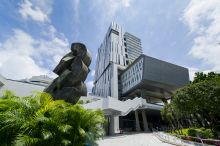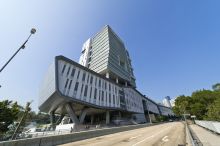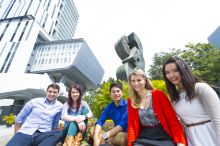In the Master of Arts in English Studies programme, students will expand their knowledge of English language and develop a critical understanding of theory and research in English linguistics, literature, and culture. Students will analyze the role of languages in diverse sociocultural contexts and multilingual societies and become attentive to language variation in social and professional contexts. They will also have the opportunity to deepen their knowledge of English language by engaging with key issues in literary and cultural studies. The programme's two streams work together to build a multifaceted knowledge of English language, which is a sought-after skill in many professional contexts. Upon completing the programme, students will be better prepared for English language teaching or for further academic study. The programme benefits from faculty with a range of international and regional research and teaching experience.
Year of Entry
2025Application Deadline
Application ClosedMode of Study
混合Mode of Funding
Non-government-fundedIndicative Intake Target
80Minimum No. of Credits Required
30Class Schedule
Weekday eveningsNormal Study Period
Full-time: 1 Year; Part-time: 2 YearsMaximum Study Period
Full-time: 2 Years; Part-time/Combined mode: 5 YearsMode of Processing
Applications are processed on a rolling basis. Review of applications will start before the deadline and continue until all places are filled. Early applications are therefore strongly encouraged.Programme Outlines
To be eligible for admission, you must satisfy the General Entrance Requirements.
Students will often hold a bachelor's degree or an equivalent qualification in English, TESL, Professional Communication, Education, or a related field. Students from disciplines related to Professional Communication, for example Business Communication, and also other disciplines, may additionally be considered from time to time.
Applicants whose entrance qualification is obtained from an institution where the medium of instruction is not English should also fulfill any one of the following minimum English proficiency requirements:
EITHER overall band 7 in the International English Language Testing System (IELTS)@; OR a score of 102 (Internet-based test) in the Test of English as a Foreign Language (TOEFL)@#. Other evidence of English proficiency will not be accepted.
@TOEFL and IELTS scores are considered valid for two years. Applicants are required to provide their English test results obtained within the two years preceding the commencement of the University's application period.
# Applicants are required to arrange with the Educational Testing Service (ETS) to send their TOEFL results directly to the University. The TOEFL institution code for CityUHK is 3401.
(1) The General Track (no stream) offers a solid foundation in English studies for students interested in an English-related discipline. It prepares students for language-intensive careers requiring higher skills in English or for higher-level research degrees. The general track comprises 3 core courses and 6 electives.
Table 1: Structure of MAES general track
|
Core courses (3) |
Language in Its Social Context Survey of Literary Genres Dissertation or Capstone Project |
|
Elective courses (6) |
Analysing Specialised Texts for Applied Purposes Approaches to Language Teaching Asian and Asian Diaspora Literature in English Critical Approaches to Literature Corpus Linguistics in English Studies Curriculum Design in Language Studies Discourse Analysis Discourse, Ideology and Power Drama-Based Pedagogy English for Academic Research in English Studies English Phonetics and Phonology Fantasy and Literature English Grammar Literature and the City New Literacies and Language Learning Research Methods in English Studies Second Language Acquisition Special Topics in English Studies Spoken Language Interactivity Studies in Literature and Film Studies in Short Fiction Teaching and Learning through English as a Medium of Instruction Teaching English for Academic Purposes Testing and Evaluation in Language Studies The Graphic Novel Travel Writing World Literatures in English |
(2) The Teaching English as a Second Language (TESL) stream provides current or future teachers of English with a background in up-to-date methods of teaching English. Incorporating a suitable mix of theory and practice, this stream will qualify students to take up advanced positions in the English Language Teaching sector on completion of the programme, or will serve as a useful preparation to higher degree studies. The TESL stream comprises 3 core courses, 2 compulsory electives, and 4 other electives.
Table 2: Structure of TESL stream
|
Core courses (3) |
Language in Its Social Context Survey of Literary Genres Dissertation or Capstone Project |
|
Compulsory TESL courses (2) |
Approaches to Language Teaching Second Language Acquisition |
|
Elective courses (4) |
Analysing Specialised Texts for Applied Purposes Asian and Asian Diaspora Literature in English Critical Approaches to Literature Corpus Linguistics in English Studies Curriculum Design in Language Studies Discourse Analysis Discourse, Ideology and Power Drama-Based Pedagogy English for Academic Research in English Studies English Phonetics and Phonology Fantasy and Literature English Grammar Literature and the City New Literacies and Language Learning Research Methods in English Studies Special Topics in English Studies Spoken Language Interactivity Studies in Literature and Film Studies in Short Fiction Teaching and Learning through English as a Medium of Instruction Teaching English for Academic Purposes Testing and Evaluation in Language Studies The Graphic Novel Travel Writing World Literatures in English |
(3) The Literature, Language and Culture (LLC) stream is designed for students who wish to explore and apply English language learning in a broad range of academic and professional contexts. It will provide students with the theoretical and practical tools they need to develop in the areas of literary and cultural studies. Students will investigate the national and transnational character of contemporary literary and cultural production; study a range of genres, theoretical schools, and periods; and have opportunities to conduct research and specialize in specific areas related to English studies. By analyzing the aesthetic aspects of literature, students will also be encouraged to apply creativity to the teaching and learning of English. The LLC stream comprises 3 core courses, 2 compulsory electives, and 4 other electives.
Table 3: Structure of LLC stream
|
Core courses (3) |
Language in Its Social Context Survey of Literary Genres Dissertation or Capstone Project |
|
Compulsory LLC courses (2) |
Critical Approaches to Literature World Literatures in English |
|
Elective courses (4) |
Analysing Specialised Texts for Applied Purposes Approaches to Language Teaching Asian and Asian Diaspora Literature in English Corpus Linguistics in English Studies Curriculum Design in Language Studies Discourse Analysis Discourse, Ideology and Power Drama-Based Pedagogy English for Academic Research in English Studies English Phonetics and Phonology Fantasy and Literature English Grammar Literature and the City New Literacies and Language Learning Research Methods in English Studies Second Language Acquisition Special Topics in English Studies Spoken Language Interactivity Studies in Literature and Film Studies in Short Fiction Teaching and Learning through English as a Medium of Instruction Teaching English for Academic Purposes Testing and Evaluation in Language Studies The Graphic Novel Travel Writing |






